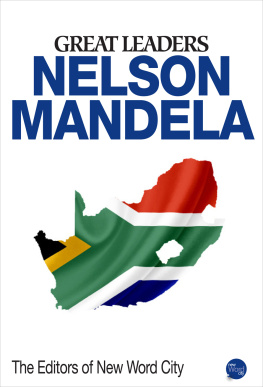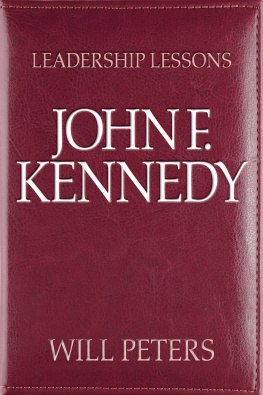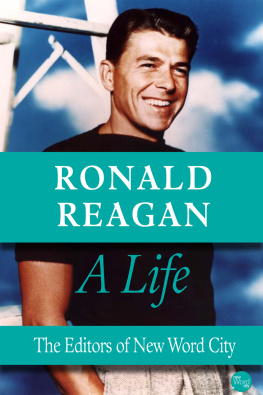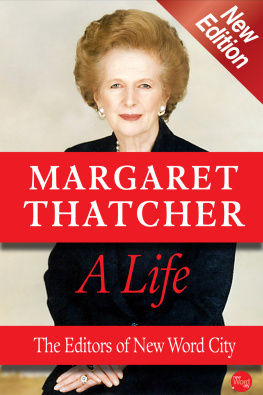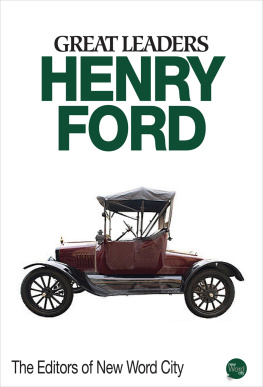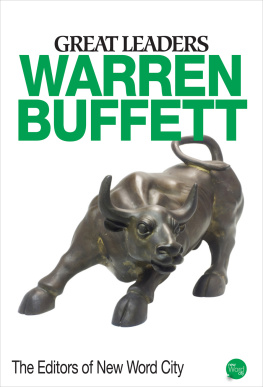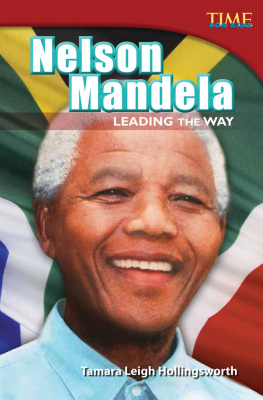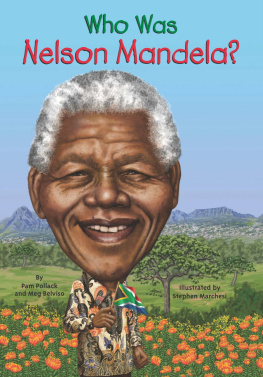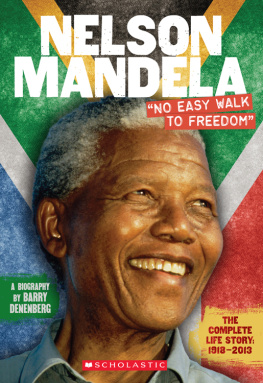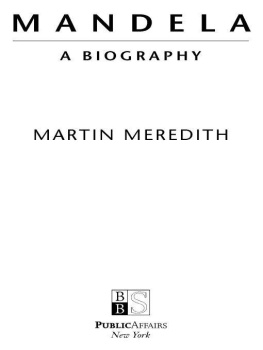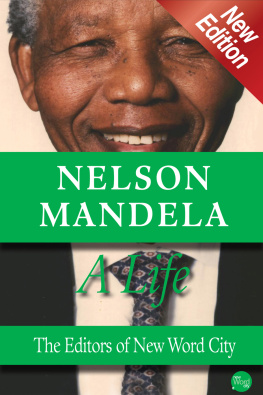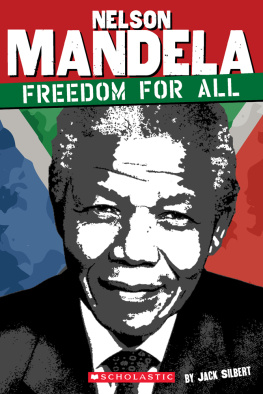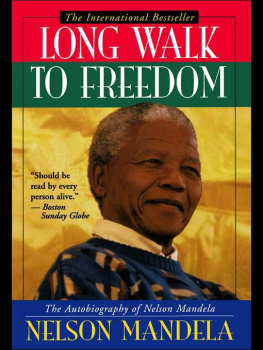The Editors of New Word City - Nelson Mandela
Here you can read online The Editors of New Word City - Nelson Mandela full text of the book (entire story) in english for free. Download pdf and epub, get meaning, cover and reviews about this ebook. year: 2013, publisher: New Word City, genre: Politics. Description of the work, (preface) as well as reviews are available. Best literature library LitArk.com created for fans of good reading and offers a wide selection of genres:
Romance novel
Science fiction
Adventure
Detective
Science
History
Home and family
Prose
Art
Politics
Computer
Non-fiction
Religion
Business
Children
Humor
Choose a favorite category and find really read worthwhile books. Enjoy immersion in the world of imagination, feel the emotions of the characters or learn something new for yourself, make an fascinating discovery.
- Book:Nelson Mandela
- Author:
- Publisher:New Word City
- Genre:
- Year:2013
- Rating:3 / 5
- Favourites:Add to favourites
- Your mark:
- 60
- 1
- 2
- 3
- 4
- 5
Nelson Mandela: summary, description and annotation
We offer to read an annotation, description, summary or preface (depends on what the author of the book "Nelson Mandela" wrote himself). If you haven't found the necessary information about the book — write in the comments, we will try to find it.
Nelson Mandela is one of historys truly remarkable figures, the father of the new South Africa and an inspiration for us all. But he was also a shrewd realist whose leadership was based not just on charisma and character, but on keenly observed examples and a deep understanding of friends and foes alike. Heres what leaders everywhere can learn from his example.
The Editors of New Word City: author's other books
Who wrote Nelson Mandela? Find out the surname, the name of the author of the book and a list of all author's works by series.
Nelson Mandela — read online for free the complete book (whole text) full work
Below is the text of the book, divided by pages. System saving the place of the last page read, allows you to conveniently read the book "Nelson Mandela" online for free, without having to search again every time where you left off. Put a bookmark, and you can go to the page where you finished reading at any time.
Font size:
Interval:
Bookmark:
When one of the airplanes two engines sputtered to a halt, the passengers onboard began to fear for their lives. But then they looked at Nelson Mandela - the man who against extraordinary odds had negotiated the end of apartheid in South Africa, the man who was now seeking the countrys presidency in the first election in which blacks would be allowed to vote. He sat calmly reading his newspaper. The other passengers quieted down.
Twenty minutes later, after the plane touched down on the tarmac, Mandela strode down the steps and across the runway to the car where his friend Richard Stengel, a writer for Time magazine, waited. The two climbed into the back seat. Man, Mandela said, I was terrified up there!
That was only one of the many lessons Nelson Mandelas life holds for all of us. His moral courage and fight against injustice helped give birth to the new South Africa. His dignity, grace, and compassion for his enemies seem almost superhuman. But as the scare on the plane suggests, his leadership was as effective as it was inspiring.
Rolihlahla Mandela was born on July 18, 1918, a member of the Thembu tribe, the son of a former chief and great-grandson of a king. His given name literally means shaker of trees, but he would grow up to shake the world.
His tribe is part of the larger Xhosa nation, which resides in the part of South Africa now known as the Eastern Cape. In the early twentieth century, the Xhosa farmed and raised livestock. They valued education, order, civility, and courtesy, ideals instilled in Mandela from birth. His mother Nosekeni Fanny - one of four far-flung wives of the wealthy chief Gadla Henry Mphakanyiswa - had her own comfortable home in the village of Mvezo, where Mandela was born. But that life was cut short when her husband defied the authorities as an act of principle.
Later, Mandela would tell the story with pride. South Africa was then ruled by Great Britain, and English laws took precedence over tribal customs. When a conflict within the tribe landed him in a British court, Mandelas father challenged its authority, insisting that the dispute was a Thembu matter. He was stripped of his chiefdom and wealth.
The lack of money forced Mandelas mother to move to another village, where she could rely on family members for help. There, Mandela writes in his autobiography, he had an idyllic boyhood gathering wild honey and fruits, swimming in clear streams, catching fish with twine and wire, and fashioning animals out of clay. He recalls long, lazy afternoons tending cattle, herding them gently by walking behind them with a small stick. Learning was through example and experience, not formal schooling. He absorbed tribal traditions, myths, rituals, and taboos.
Mandelas mother converted to Christianity, and he was baptized when he was seven. Soon after, the boy was sent to a church school not far from his village. He had never worn Western clothes. For his first day of school, his father cut off a pair of his own pants at the knees and cinched the waist with rope.
That was also the day the teacher gave Mandela his English name Nelson. It was a precursor to Mandelas later fascination with British ideas, culture, and institutions. In his autobiography, he confessed to the paradox of being something of an Anglophile.... [T]he very model of the gentleman for me was an Englishman.... While I abhorred the notion of British imperialism, I never rejected the trappings of British style and manners.
Mandela was nine when his father died of lung disease. His mother sent him to stay with an old friend of his father. Chief Jongintaba, who was the regent of the Thembu people and presided over an impressive compound known as the Great Place at Mqekezweni. For a boy from a tiny village, the Great Place offered an unimagined level of comfort and instruction.
Young Mandela did well in school and soaked in lessons outside of the classroom by listening and watching. He was particularly impressed by how Jongintaba led the Thembu people - a manner that Mandela later emulated as South Africas president.
Council meetings were held as needed to evaluate new edicts issued by the British magistrate, property disputes, and any other matters related to the tribe. All male members, whatever their rank, were allowed to attend and speak. Mandela listened as some made succinct arguments and others rambled, and he noted how some sought to appeal to reason and others to feelings. Many strongly criticized the regent himself. Through it all, Jongintaba listened intently but betraying no emotion. At the end of meetings, which usually lasted all day, the regent stood and summarized what had been said and then subtly steered the tribe to agreement. It is wise, Mandela said years later, to persuade people to do things and make them think it was their own idea.
When he was sixteen, Mandela left the Great Place to attend Clarkebury Boarding Institute, an elite, all-black prep school. The white headmaster, Reverend C. Harris, maintained a stubborn facade, but he was a kind man who cared deeply about educating African children. Mandela admired him for his selfless devotion to his students.
Mandela went on to the University of Fort Hare, the preeminent, black-African institution of higher learning. He took up competitive sports, including boxing and long-distance running. Although he was not a naturally gifted athlete, he excelled because of his disciplined training. That began a regimen of daily exercise that would help keep him fit throughout his life.
Fort Hare was filled with bright scholars, many of them openly advocating increased rights for black Africans. This was where Nelson Mandela first learned about the African National Congress (ANC). Founded in 1912, the organization sought to advance the black cause in South Africa.
When the first Dutch settlers arrived at the Cape of Good Hope in 1652, they found a country sparsely populated by scattered tribes. The new settlers, who called themselves Afrikaners, were unrepentantly racist and brutally subjugated the indigenous population. The British took over early in the nineteenth century, full of pomp and empire and certain of their superiority to both blacks and Afrikaners (also called Boers). Tension between the white rivals continued to grow, culminating in the Boer War, which lasted from 1899 to 1902. The British won the war and began a period of dominance that would last until the Afrikaners National Party (ANP) won the 1948 election. It was the new Boer Prime Minister Hendrik Verwoerd who would pass the laws of apartheid that made the lives of blacks more unbearable than ever.
In standing up for black rights, the ANC had never been fanatical. Now, as the crisis of apartheid loomed, the organization was timider than ever, led by a wealthy doctor unwilling to risk his reputation and career by adopting an aggressive strategy.
But full apartheid was yet to come. Back at Fort Hare in 1941, students were keenly following World War II. South Africa had joined the Allies in declaring war on Germany, but the National Party was openly sympathetic to the Nazis. As Mandela became engaged in the larger world, his knowledge of black oppression increased, and his fledgling ambitions began take shape. Most important, his moral compass was finding its true north. It was soon tested when he disputed the results of a student election. His stance was as principled as his fathers had been when he challenged British authority, but the outcome was no better: Mandela was suspended.
Returning to the Great Place, Mandela rebelled when Jongintaba told him that a wife had been selected for him. He chose instead to create a new life in Johannesburg, the prosperous center of the gold mining industry, where jobs were plentiful in the wartime boom.
Wanting to be a lawyer, Mandela went to work as a clerk for a subsistence salary at the white law firm of Witkin, Sidelsky, and Eidelman. It was unusual for a black person to have such a job, and Mandela thought it was offered because his employers, as Jews, had historically been victims of prejudice. But they were as prejudiced as any other white South Africans. After he reported for work, Mandela was given some money and told to get himself a tin teacup. He was not to drink tea from the china cups provided to white employees.
Next pageFont size:
Interval:
Bookmark:
Similar books «Nelson Mandela»
Look at similar books to Nelson Mandela. We have selected literature similar in name and meaning in the hope of providing readers with more options to find new, interesting, not yet read works.
Discussion, reviews of the book Nelson Mandela and just readers' own opinions. Leave your comments, write what you think about the work, its meaning or the main characters. Specify what exactly you liked and what you didn't like, and why you think so.

